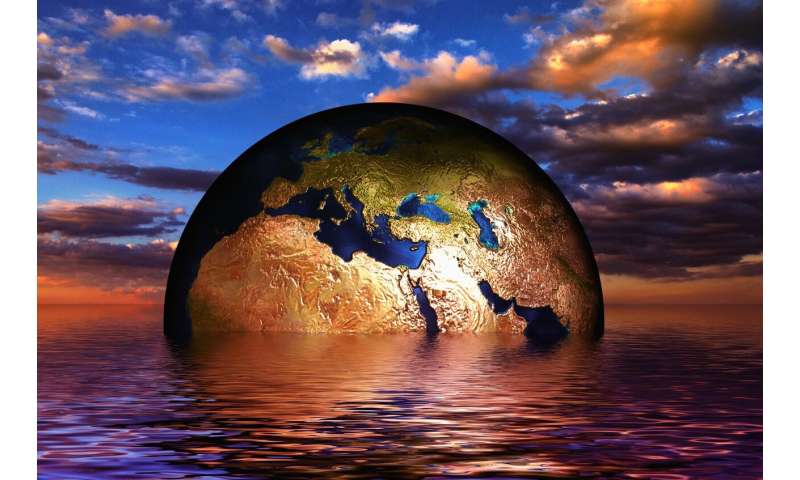Pour le 3
eme article de PHYS ORG que j avais
signalé a mes lecteurs ,à savoir : : « Climate change likely drove early human
species to extinction, modeling study suggests »je n’ai pas les
connaissances d’un paléo- anthropologue
, aussi après l’avoir traduit pour moi-même
ai-je laissé a mes lecteurs anglophones
le soin de le traduire pour eux-mêmes . Seul au fond m’intéressait leu conclusion sur la
faible résistance des diverses
variétés d’ hommes fossiles aux changements climatiques survenus ce dernier millions d’années …La
plupart est allé vers la régression territoriale
puis vers l’extinction
La conclusion de l’auteur est un avertissement ;qu’ils soient
chasseurs ou cueilleurs ou pécheurs ,anthropophages ou charognards de prédateurs plus forts qu’eux ……qu
ils marchent droit ou courbés etc mais avec
des territoires sans frontières ni gendarmes
,leurs migrations ne les ont pas
protégés des hauts et bas climatiques …
Et les auteurs en déduisent que ce qui nous pend sur la tête pourrait être bien pire ….Et je rajoute surtout compte tenu de la démographie actuelle et des peu d’efforts que nous faisons coté CO2 ….Brf l homo sapiens actuel qui a frisé l extinction de peu pourrait bie remettre çà!!
Climate change likely drove early human species to extinction, modeling study suggests

Of the six or more different species of early humans, all belonging to the genus Homo, only we Homo sapiens have managed to survive. Now, a study reported in the journal One Earth on October 15 combining climate modeling and the fossil record in search of clues to what led to all those earlier extinctions of our ancient ancestors suggests that climate change—the inability to adapt to either warming or cooling temperatures—likely played a major role in sealing their fate.
"Our findings show that despite technological innovations including the use of fire and refined stone tools, the formation of complex social networks, and—in the case of Neanderthals—even the production of glued spear points, fitted clothes, and a good amount of cultural and genetic exchange with Homo sapiens, past Homo species could not survive intense climate change," says Pasquale Raia of Università di Napoli Federico II in Napoli, Italy. "They tried hard; they made for the warmest places in reach as the climate got cold, but at the end of the day, that wasn't enough."
To shed light on past extinctions of Homo species including H. habilis, H. ergaster, H. erectus, H. heidelbergensis, H. neanderthalensis, and H. sapiens, the researchers relied on a high-resolution past climate emulator, which provides temperature, rainfall, and other data over the last 5 million years. They also looked to an extensive fossil database spanning more than 2,750 archaeological records to model the evolution of Homo species' climatic niche over time. The goal was to understand the climate preferences of those early humans and how they reacted to changes in climate.
Their studies offer robust evidence that three Homo species—H. erectus, H. heidelbergensis, and H. neanderthalensis—lost a significant portion of their climatic niche just before going extinct. They report that this reduction coincided with sharp, unfavorable changes in the global climate. In the case of Neanderthals, things were likely made even worse by competition with H. sapiens.
"We were surprised by the regularity of the effect of climate change," Raia says. "It was crystal clear, for the extinct species and for them only, that climatic conditions were just too extreme just before extinction and only in that particular moment."
Raia notes that there is uncertainty in paleoclimatic reconstruction, the identification of fossil remains at the level of species, and the aging of fossil sites. But, he says, the main insights "hold true under all assumptions." The findings may serve as a kind of warning to humans today as we face unprecedented changes in the climate, Raia says.
"It is worrisome to discover that our ancestors, which were no less impressive in terms of mental power as compared to any other species on Earth, could not resist climate change," he said. "And we found that just when our own species is sawing the branch we're sitting on by causing climate change. I personally take this as a thunderous warning message. Climate change made Homo vulnerable and hapless in the past, and this may just be happening again."
Provided by Cell Press
Bref l"homo sapiens actuel a frisé l’extinction de peu mais il pourrait bien remettre çà !
Aucun commentaire:
Enregistrer un commentaire